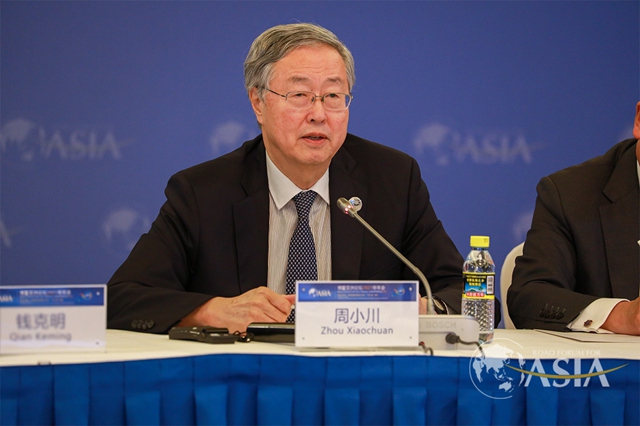Asia being a key factor of global economic recovery

Zhou Xiaochuan, former governor of the People's Bank of China. [Photo/boaoforum.org]
Asian countries should try to attract new capital for development, thus laying a solid foundation for economic recovery in Asia and the world, said a Chinese expert during an international meeting.
While taking active actions to curb the spread of coronavirus, Asian countries should work with the international community to provide urgently needed assistance for other countries, and be well-prepared for the global economic recovery, said Zhou Xiaochan, former governor of the People's Bank of China, the central bank.
"What the world economy needs now is to strengthen the weak links and accelerate economic transformation," Zhou, vice-chairman of the Boao Forum for Asia, said in his speech at the 26th international conference on the future of Asia.
This year's online gathering, focused on Asia's role in the global recovery in the post-COVID era, invited political, economic and academic leaders from the Asia-Pacific. It was held by Japan's Nikkei, a financial newspaper, on Thursday and Friday.
"The world should focus on filling the shortfall in public health and infrastructure and push forward green and digitalized transformation to achieve more sustainable economic recovery, faster development, and a more inclusive human society," said the former central bank governor.
Entering 2021, the pace of global economic recovery has been obviously speeded up thanks to the accelerated COVID-19 vaccination around the world and large-scale stimulus policies adopted by various countries.
However, the pandemic still "remains a major variable directly affecting the economic performance of Asian countries", which were the first to start to recover, Zhou said.
"The unprecedented COVID-19 outbreak has exposed the limitations and weak links of the healthcare systems in various Asian countries."
It also highlighted the necessity of filling infrastructure shortfall in Asia, especially enhancing the resilience of hardware and software infrastructure and maintaining unimpeded supply chains and trade amid the pandemic, he added.
As an experienced expert in the financial sector, Zhou said Asian countries should attach importance to the G20 Debt Service Suspension Initiative and the financial support options provided by global and regional financial safety nets.
"Financial safety nets at various levels can provide more financial support options for Asian countries, especially those vulnerable to the impact of the pandemic, to maintain their macroeconomic stability."
He also suggested that Asian countries should focus on attracting socially responsible investments, medium to long-term funds, and equity investments, as well as make better use of local funds.
Meanwhile, the investment cooperation between China and Japan, key traders and investors in the world, should be further enhanced to provide urgently needed new funds and new technologies to boost sustainable economic recovery of the two countries, Asia and even the world, Zhou said.
Specifically, the two neighboring countries could deepen the cooperation in both green development and digital economy, Zhou said, as China and Japan has each formulated plans on these two fields.
Answering the question on green finance, the expert said it "helps to raise global awareness in all respects", and its most important role "lies in changing the future allocation of resources, especially financial resources, allowing investment and loans to be further tilted toward low-carbon development".
"We believe that through strengthening cooperation, filling the existing gaps, and pushing forward future-oriented transformation, Asia will play an important leading role in global economic recovery and make greater contributions to the prosperity and stability of the world economy."








